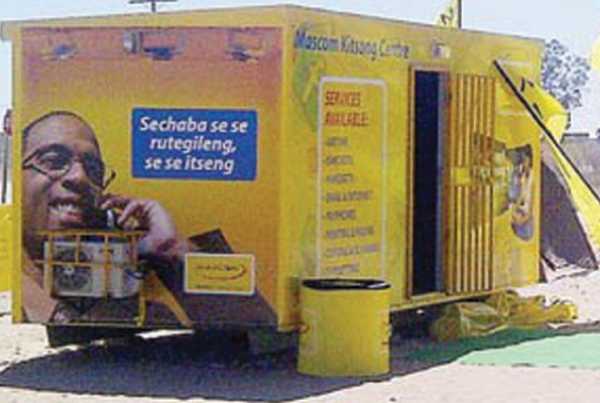BTCL revives its Kitsong centres
Botswana Telecommunications Corporation Limited (BTCL) recently entered into a partnership with the Ministry of Transport and Communications to resuscitate the Kitsong Centres, Botswana Guardian can reveal.
BTCL Public Relations Manager, Golekanye Molapisi, revealed to Botswana Guardian that, through the arrangement with the Ministry, Botswana National Youth Council (BNYC) will take over the management of the Kitsong Centres. “The centres will be owned and run by youth within the communities where these centres are located.
This forms part of the BNYC overall strategy named Project 50, which is aimed at the creation of 50,000 jobs within five years,” he said. As part of implementation process, application forms for youth selection were distributed to villages, he said. After selection, the chosen youth were trained in business management and analysis.
“Thereafter, handover commenced with 31 Kitsong Centers handed over to date, with the rest to be handed over by May 2016,” Molapisi told Botswana Guardian.
How BTCL Nteletsa 2 started
In 2002, government engaged BTCL for its Rural Development Programme, Nteletsa Project. BTCL, through this project installed and commissioned 148 Kitsong Centres countrywide as part of the government rural telecommunications deployment programme.
The Kitsong Centres were handed over to local Village Development Committees (VDCs) for management and day-to-day operations, on a profitability basis with a view to improving the livelihood of those communities. But due to operational challenges, this model has not been successful hence its suspension a few years ago.
How Nteletsa 1 Project started
BTC, in partnership with the government, first implemented the Nteletsa programme - aimed at rural and underserved communities with access to telecommunications services, in 1999 with the Nteletsa 1 project. In this project, phone sets used were powered by solar panels as most of the villages in the project were not electrified.
The solar panels began to be stolen at an alarming rate. The company had to spend millions from its coffers to replace the panels. As a result, this defeated the purpose of the project and left many villages without telecommunications services. This eventually forced the corporation to replace the phones with the new FWT technology.
Mascom Kitsong Centres
Five years ago, as part of the country’s Nteletsa 2 Rural Development Project, Mascom came on board. 41 Mascom Centres were set up across rural villages countrywide by Mascom Botswana. The initiative was mainly established to empower local entrepreneurs with digital skills and roll out essential services to local communities. These were far flung dusty areas where ICT services were very scarce.
Narrating on the journey, Mascom Chief Information Officer, Lilly Sullivan said it all started in 2010 with only 41 beneficiaries, and to-date- the beneficiaries have doubled to 94. Sullivan described Kitsong centres as the pinnacle of the company’s corporate social responsibility initiatives.
“We have realised the need to bridge the gap between urban and rural communities and ICT is one of the ways that Mascom has successfully managed to change mindsets of communities, one village at a time.”The Mascom Kitsong centre package includes a branded porta cabin equipped with computers, printers, copiers and data cards.
Entrepreneurs operate the fully equipped centres to provide essential services to communities including email and internet, mobile money, airtime, SIM card, printing and photocopying. These beneficiaries are now able to run their own cafes, and overtime, she said this initiative will provide long term solutions to the communities.
It has not been an easy journey. Just like any other business, she said some have struggled and have not been able to make significant returns while others have kept on despite the hardships and still survived. “We urge the government and other private companies to help us make this initiative more sustainable. At least small businesses in rural areas should be reserved for the Kitsong centres,” she urged.
To this day, Mascom has now prioritised computer literacy and has so far trained and certified 19 Kitsong centres across the country. “19 centres have successfully completed the ICDL programme and have been certified by the University of Botswana. To date, Mascom has injected over P20million on the initiative, while the government has spent P430 000 as a grant towards the initiative.
The minister of Transport and Communications, Tshenolo Mabeo last week called on other companies to partner with government to channel some of its investments towards ICT initiatives to grow the economy. Heeding to this call, Business Botswana ICT sector chairman- Neo Nwako told Botswana Guardian that as private sector they need to see broadband impact happening at a rural community level.
The regulator, Botswana Communications Regulatory Authority (BOCRA), in April 2014 established the Universal Access and Services Fund (UASF); with an objective of facilitating an enabling environment for the development and use of communications infrastructure and services in Botswana.
In relation to this, Nwako said this offers an opportunity for the private sector companies to participate. “Government has proposed for the private sector to provide hardware infrastructure and digital content for the schools. Currently there is dialogue between government and private sector to ensure that all strategies are aligned. We urge the government to leave the delivery and implementation to us as the private sector to only focus on policy making which it is good at,” he said.
At the time of writing Orange Botswana had not yet responded on its ICT programmes.





